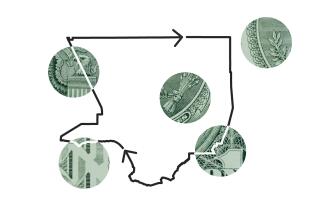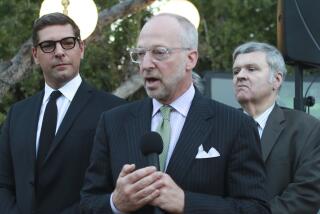Garcetti Rivals Hammer at Propriety Issue
- Share via
Last May, Woodland Hills-based Zenith Insurance donated $25,000 to Dist. Atty. Gil Garcetti’s reelection campaign.
Four weeks later, Garcetti’s office charged a dozen people with fraud and other crimes in connection with a purported workers’ compensation scam.
One of the alleged victims in the case: Zenith Insurance.
Garcetti’s critics allege, at the very least, an appearance of impropriety.
Garcetti vigorously denies any political favoritism, saying the case has been handled “in the most professional, ethical way.”
With the March 26 primary less than two weeks away, the Zenith case illustrates the peculiar peril of being the incumbent district attorney--particularly an incumbent with nearly $1 million in campaign funds in the bank.
The cash enabled Garcetti last week to launch a heavy schedule of television ads.
At the same time, his opponents have been scouring Garcetti’s donor list, and inquiring about the propriety of cases that Garcetti’s office has prosecuted involving significant donors. Among them:
* The Zenith case. Overall, Zenith has given Garcetti $82,500 since 1992, according to county records.
* Ongoing trademark infringement cases involving Guess? Inc. Since 1992, Guess and company co-founder Georges Marciano have contributed $220,000.
* And a “three strikes” case that ended in November with reduced charges for the grandson of Westside businessman B. J. McMorrow--a case in which a possible sentence of life in prison was cut to 16 months. The elder McMorrow gave Garcetti about $13,000 in 1992 and an additional $1,000 in recent weeks.
“The joke going around the courthouse right now is, how much does it take to get a strike struck?” said Todd Blair, campaign manager for Harold Greenberg, one of the five challengers. “The answer is: Guess!”
Garcetti said he has nothing to apologize for. And he said that criticism comes with the territory--as do jokes.
*
“We’re in a political season,” he said. “The facts are very clear. The facts demonstrate that people who have contributed to me don’t get anything [in return] and don’t expect any favored treatment.”
Zenith contributed $50,000 to Garcetti in October 1992; $2,500 in September 1993; $5,000 in November 1994, and $25,000 on May 30, 1995.
Just four weeks later on June 29, prosecutors filed the theft charges.
Defense lawyers, citing the campaign contributions, took the unusual step of asking Superior Court Judge Michael Cowell to recuse the entire district attorney’s office from the case.
“After all,” said one legal brief filed by the defense, “justice ought not to be for sale.”
Cowell ruled last month that the defense had not proven any real or apparent conflict of interest.
Edward G. Feldman, acting head of the D.A.’s workers’ compensation fraud unit, said the timing--campaign donation in May, charges filed in June--was “really coincidental.”
He said he and the two prosecutors directing a long-term investigation--which dated to the June 1993 service of search warrants--decided by themselves that the case was ready to be filed.
“It was made entirely at our level without any input, encouragement, discouragement or guidance from above, which is the way we make decisions on all of our cases,” Feldman said.
Garcetti said he “knew nothing about the investigation”--even though he and Stanley Zax, Zenith’s chairman, serve together on a state commission searching for ways to improve California’s juvenile justice system.
He and Zax, he said, have seen each other “seven, eight, nine times” over the last year, and spoken “two or three times” beyond that, “invariably about juvenile justice issues.”
“We’ve never discussed even the general issue of workers’ comp fraud,” Garcetti said.
Election disclosure statements reveal that Zenith provided plane trips twice last year for Garcetti, once on Aug. 17, then on Oct. 12. The combined value of the trips was $293.
Garcetti said the trips were in connection with the state juvenile justice panel. “Saved the county some money,” he said.
Zax did not return calls seeking comment.
Neither did Marciano.
“Would I return his phone call?” Garcetti said of Marciano. “You bet I’d return the call. I like the man.”
Garcetti added, however, that he has not spoken to Marciano in about a year. Their last conversation, he said, occurred about a week before Marciano made an April 5, 1995 donation to Garcetti’s campaign of $50,000.
In Garcetti’s 1992 campaign, Guess gave him $170,000.
Garcetti said he and Marciano met during that 1992 campaign and “hit it off.”
“I told him about my concerns about workers’ comp fraud and about crime in general,” Garcetti said. “I was working to make sure that my family, my kids, my future grandchildren were going to live in a community that was in fact safe.
“He basically said, ‘I believe in you. I trust you. And I want to support you.’ ”
Since becoming district attorney, Garcetti said he has spoken with Marciano two or three times. “He has never asked me about any cases,” Garcetti said.
Garcetti’s office routinely prosecutes trademark infringement cases, and those cases regularly involve Guess, which is a powerhouse in Los Angeles’ garment industry.
Bill Clark, the deputy district attorney who usually handles such cases, said his current caseload of 16 includes three cases involving Guess. Typically, he said, the cases concern allegedly counterfeit jeans or wristwatches bearing the famous triangle label.
Marciano, however, resigned as Guess chairman in August, 1993, selling his 40% stake back to the company and leaving his three brothers in charge.
*
It remains unclear why Marciano gave Garcetti so much money last year. The $50,000 donation was double Garcetti’s next-largest 1995 contributions--$25,000 apiece from Zenith and the Southern California District Council of Carpenters.
“Trying to figure this one out,” said lawyer Marshall Grossman, who represented the Marciano brothers for five years, “is trying to apply logic to an enigma.”
Meanwhile, Garcetti’s challengers repeatedly have questioned the logic of the 16-month sentence in the McMorrow case.
“Sixteen months is the last step before a dismissal and an apology,” said challenger John F. Lynch, who heads the district attorney’s Norwalk office.
Brian John McMorrow, a two-time convicted robber, was charged with attempted arson for pouring gasoline on the vehicles of two men with whom he had a business dispute.
After he was arrested, his grandfather called Garcetti to inquire about the case. Garcetti took the call.
Ultimately, Garcetti told the elder McMorrow that there was nothing he could do. Garcetti repeatedly has stressed that he was not involved in any way in the outcome of the case.
On Nov. 22, the younger McMorrow pleaded no contest to the lesser charge of attempted vandalism.
As part of the deal, prosecutor James Falco and his immediate boss, Robert Schirn, agreed to strike one of the prior “strikes,” reasoning that the case would be difficult to prove to a jury and that McMorrow’s record had been clean since his robbery convictions in 1983, when he was 19.
Garcetti said Wednesday it is not unusual to get calls about cases. Often, he said, ministers call. Occasionally, it’s a contributor.
In response to about 20 such calls since 1993, he said, he has asked a staffer to check whether the facts in a case warranted the charges and the possible punishment. In every one of those cases, he said, the charges were appropriately filed and a return call was placed to say just that.
“That’s what happened in McMorrow,” he said.
Such explanations have not moved the Assn. of Deputy District Attorneys, which last week asked the attorney general’s office to look into the McMorrow case.
Garcetti said he would welcome such an inquiry and is confident his office acted properly. “I hope,” he said, “the A.G. looks at it today.”
More to Read
Sign up for Essential California
The most important California stories and recommendations in your inbox every morning.
You may occasionally receive promotional content from the Los Angeles Times.













